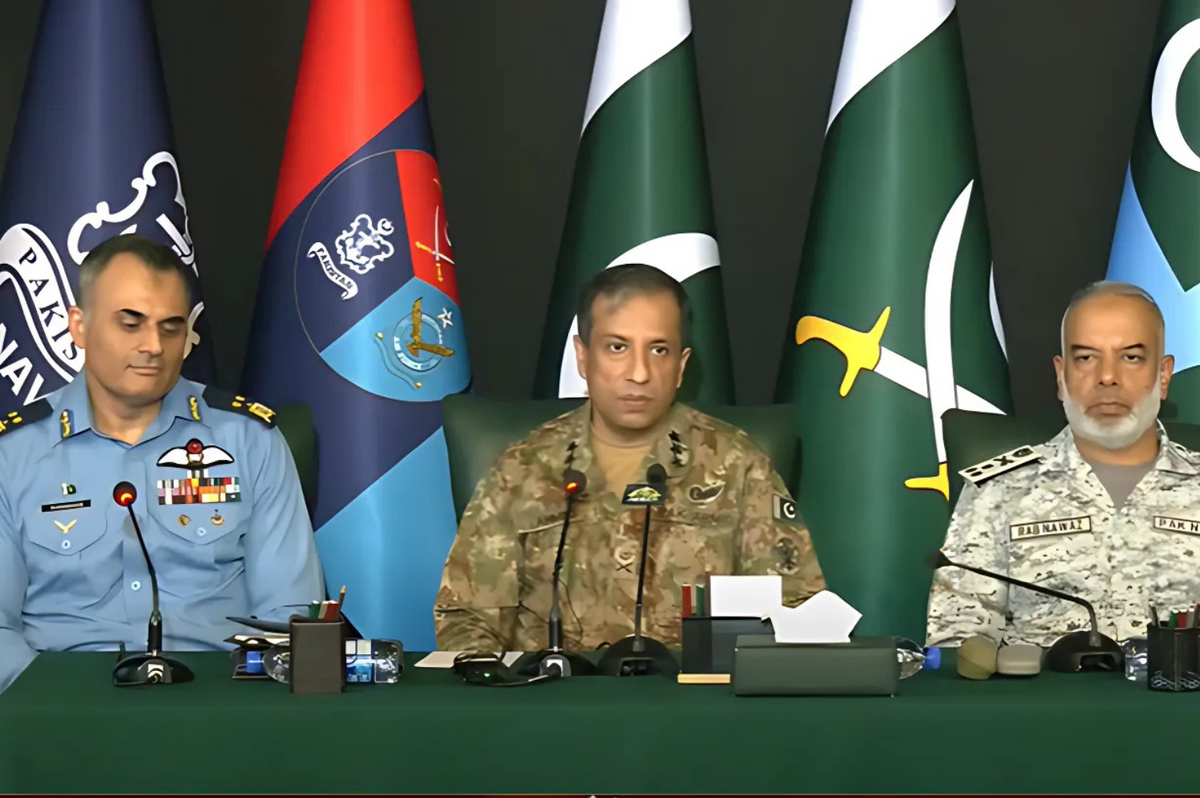
Director General of Inter-Services Public Relations (ISPR) Lt Gen Ahmed Sharif Chaudhry (C) addresses a press briefing attended by international journalists in Rawalpindi on Friday.
Screengrab
The spokesperson for Pakistan’s armed forces addressed on Friday international journalists, strongly rejecting India’s accusations linking Pakistan to the recent attack in Pahalgam and raising questions over India’s internal security failures.
Joined by senior officials from the Pakistan Air Force and Pakistan Navy, Director General of Inter-Services Public Relations (ISPR) Lt. Gen. Ahmed Sharif Chaudhry said Pakistan would protect its sovereignty and dignity at all costs. “India immediately blamed Pakistan without presenting any credible evidence,” he said, referring to the deadly incident in Pahalgam last month.
The remarks came as tensions soared between the rival nations. Pakistan’s state media reported that the country had intercepted and destroyed 77 Indian drones over the past two days. India, on the other hand, claimed it had shot down two Pakistani fighter jets in a retaliatory operation — a claim Islamabad has strongly denied.
On the latest escalation, the military spokesperson said: “We are only targeting Indian military posts along the Line of Control. We are exercising great caution because the Pakistani state, its people, and armed forces do not believe in targeting innocent civilians. Neither our religion nor our moral values permit it.”
He said Pakistan has so far taken down 77 drones sent by India.
“Whenever these drones enter our airspace, we detect them. India assumed these high-tech aircraft would cause havoc, but we’ve taken out every single one. Not a single drone has made it back to India. We’ve tracked and intercepted each of them. We remain vigilant and will not allow anyone to violate our territorial integrity and sovereignty.”
The DG ISPR said that Indian forces were “targeting civilians, including women and children, under the guise of counterterrorism operations”. He also shared what he said were examples of disinformation being spread by the Indian media, accusing it of churning out false narratives without substantiation.
Lt. Gen. Chaudhry presented video clips and social media posts from Indian-administered Kashmir and other parts of India, where citizens and political figures have openly questioned the Indian army’s role in the Pahalgam incident.
“Terrorists came, carried out the attack, and left -- where was the Indian Army?” he quoted Kashmiri citizens as asking. “Even Indian politicians have expressed serious concerns about security lapses.”
He said the Indian public was increasingly skeptical of the government’s version of events.
“Indian citizens themselves are calling this another Pulwama-style drama,” he added, referring to the 2019 Pulwama attack, which also led to heightened India-Pakistan tensions.
The military spokesperson also challenged the Indian military's presence in Kashmir, noting the high troop concentration. “In a region with 700,000 troops, how did terrorists manage to infiltrate and escape?” he asked.
The DG ISPR further said that the Indian government and military had failed to answer the serious questions being raised by their own people. “Even Indian citizens are saying: don’t blame Pakistan -- examine your own failures.”
He asked India to refrain from baseless allegations and instead focus on introspection. “Aggression against civilians cannot be justified, and facts cannot be buried under propaganda.”
No direct contact
Lt. Gen. Chaudhry dismissed reports of any direct contact between the national security advisers (NSAs) of Pakistan and India.
“I can confirm I have news about contact between NSAs of Pakistan and India… but no such communication took place,” he said. “As for indirect contacts, the ministry can comment on that.”
“There is no direct contact,” he stressed. “If one party is talking to someone, and that party is talking to someone else, that’s another matter. But I can confirm there is no direct [NSA] contact.”
The DG ISPR said Pakistan was prepared for any eventuality. “They [India] will start it, but we will finish it.”
He denied Pakistan’s involvement in the recent Pahalgam incident, saying: “Pakistan has nothing to do with it. If you have evidence, present it before an international investigation. We do not support any terrorist entity. We are a victim of terrorism. We know terrorists have no religion or state — they are inhuman. We stay as far away from them as possible.”
Responding to a question on recent tensions, he said: “Who is escalating here? Who is provoking time and again? They want to set a new norm by harassing the people of Pakistan. Can we allow that to happen? We have every right [to respond].”
He added, “We have only been defending ourselves. We’re rubbing their nose in it every day — wherever they come from.”
New wave of escalation
The latest round of hostilities was triggered by a deadly April 22 attack in Pahalgam, in Indian-administered Kashmir, where 26 Indian tourists were killed by unknown gunmen. India blamed Pakistan for the attack, while Islamabad denied any involvement and called for an impartial investigation.
On Wednesday, India said it struck nine “terrorist camps” in Pakistan in response to the Pahalgam attack.
Pakistan denied the presence of militant sites, saying 31 civilians were killed. It also claimed to have shot down five Indian jets—an assertion India dismissed, though some reports partially confirmed the damage.
Clashes have since intensified along the Line of Control and beyond.
The current crisis marks the worst military flare-up between India and Pakistan since the 1999 Kargil conflict.
For the first time since the 1971 war, Indian strikes targeted cities deep within Pakistan’s mainland.
India and Pakistan have fought three wars since their independence from Britain in 1947—two of them over Kashmir. The latest tensions come at a fragile time for Pakistan’s economy and risk spiraling into a broader regional conflict.







Comments
See what people are discussing